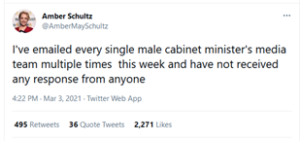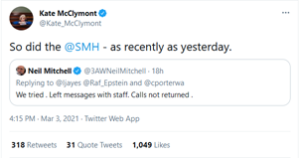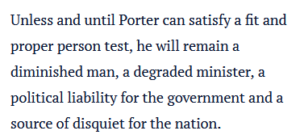There was an outpouring of grief for the “trembling, tearful wrecks” of Cabinet Ministers forced on to sick leave, having to experience such ‘humiliating’ and ‘devastating’ claims. Some particularly callous commentary equated Porter’s life with that of the “ruined” life of the woman who died by suicide.
Before Wednesday
Christian Porter’s alleged rape of a 16-year-old in 1988 was the only topic on anyone’s lips. Predictably, the media protection racket went into overdrive.
Chris Uhlmann at Nine News and Paul Kelly at The Australian were concerned about a “trial by media”, even though that is essentially journalism, as noted by experts, including senior research fellow Denis Muller. As Muller wrote, the media did their job of being watchdogs.
Nine News
The Australian
Tom Percy, in The Sydney Morning Herald, reckoned the legal requirement of innocent until proven guilty had “surely, become reversed”. I wonder how that stacks up against data suggesting 3% of reported sexual assaults result in a conviction, while the vast majority of sexual violence is never reported to the police.
Aaron Patrick, for the Australian Financial Review, reckoned the minister’s silence was “dignified”, and that Sarah Hanson-Young was merely point-scoring on the basis of the minister being a privileged, white male.
….
It took Susie O’Brien at The Herald Sun (of all papers) to call for action.
After Wednesday
After Attorney-General Christian Porter outed himself as the accused, the protection racket went into overdrive.
The Australian Financial Review parroted Porter’s idea that the rule of law would no longer exist if he should step down – a straw man argument, as the loudest calls have been made for the purposes of establishing an inquiry – as well as unchallengingly repeating his claim that the allegations had not been put to him by journalists.
This doesn’t stand up to scrutiny. At risk of using social media as a source of information, swathes of the media sought comment from the Attorney General, from Amber Schultz at Crikey, to Samantha Maiden at news.com.au, Neil Mitchell at 3AW and Kate McClymont at The Sydney Morning Herald.
Porter’s office then rowed back on the allegations.
Elsewhere, the media seemed far more concerned with the state of Christian Porter than rape victims. Dennis Shanahan and Nicola Berkovic in The Australian were concerned about the “trembling, tearful wrecks forced on to sick leave” and the “cruel” effect of the allegation on Porter;
Rob Harris at The Sydney Morning Herald seemed particularly callous, equating the complainant’s “ruined” life with Porter’s. One person was allegedly raped and died by suicide 30 years later. The alleged perpetrator will face no criminal investigation, but may have to stand down and move into a cushy consultancy job. Hardly apples and apples.
….
Jennifer Hewett at the Australian Financial Review lamented the “strained, emotional” Attorney General, seemingly attempting to drum up sympathy for the “humiliating” and “devastating” claims. She didn’t care to challenge Porter’s claims that Bill Shorten, when accused of rape in 2014, did not undergo trial by media.
Samantha Maiden, however, pointed out that that story made the front page of the The Australian. Whoops.
Meanwhile Peter Hartcher at The Sydney Morning Herald, fresh from his somewhat fawning coverage of Josh Frydenberg:
had some harder-hitting commentary, pointing out the failings of Morrison’s response. Preparing the ground for a leadership challenge?
….
Chris Kenny at Sky News went so far as to compare the coverage to the Salem Witch trials, but Porter’s press conference didn’t merit an appearance on any of Sky’s social media.
Meanwhile, writer Osman Faruqi perhaps put it best in the mere 280 characters Twitter allows:
Michael Tanner is completing a Doctor of Medicine/Doctor of Philosophy. His writing explores the intersection of economics, the media and public health. His writing has also been published in The Age. Michael’s Twitter handle is @MichaelTanner_



































Comments
3 responses to “Porter allegations: Accusations fly of ‘trial by media’; AKA journalists doing their job”
Good article endeavouring to hold power to account while our legacy media is part of the racket and issues round Australian democracy, politics and media; the latter too often do not reflect Australia nor voters but the LNP and NewsCorp culture…..
Mr Tanner: keep at the hypocrites. You are making inroads. And of course he should not be AG. And of course the allegation should be published and then answered.
As with the reporting of the compulsory media bargaining issue, it has been a time when conflicted journalists rushed to abandon their duty to report objectively as they wrote in favour of a scheme that preferred their employers over the wicked tech giants who are doing more for their advertisers than obsolete print can deliver. Employers’ interests were promoted despite there being no guarantee working journalists would keep their jobs or benefit otherwise if it did not please those employers.
Similarly, presumably for political reasons or reasons of friendship, journalists like those mentioned, and even Peter van Onselen, have pushed superficially appealing arguments about the sanctity of the criminal justice system’s, concepts of guilt when it comes to measuring a person for fitness to the job of Attorney General or even being a minister. False equivalences have been stretched past their breaking point.
Every second person seems to have studied law, but generally understanding of the law is abysmal, with concepts being mangled and extrapolated as social mediators, and now journalists, rush to distorted conclusions. Do genuine misunderstandings of the criminal justice system explain these journalists’ reaction to the press conference or are these journalists pushing a barrow? Normally these scribes are quick to have a piece of people in power, these people in particular. But not this time? Is their contribution as valuable as they would like us to believe such their preservation is in the national interest?
Why are these journalists so determined to deflect the debate from the real issue with their red herring arguments? The outcry from the public is not about a search for legal notions of guilt i.e., leading to a court-imposed penalty or term of detention. It is about the right to hear the full substance of what is claimed and the material available to back that claim.
Without a formal inquiry, who will publish the complainant’s file under fear of the threat of defamation proceedings?